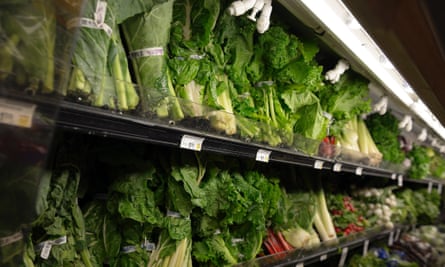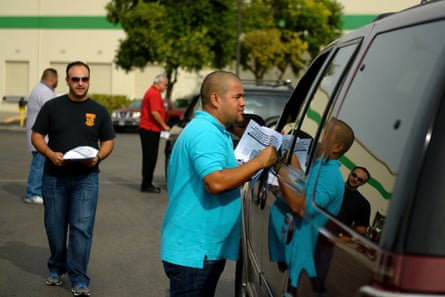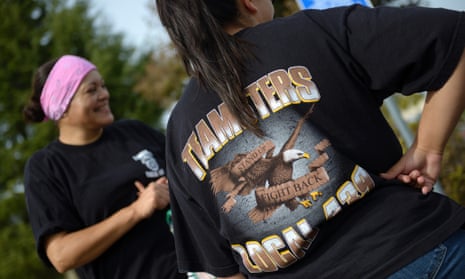A lot of America’s healthy eating options pass through two cream-coloured, windowless buildings in a scruffy California town called Tracy.
Here Taylor Farms, the world’s largest supplier of cut vegetables and salad, packages produce which ends up at Safeway, Walmart and Costco, as well as McDonald’s, Chipotle, Subway and Starbucks.
Taylor Farms has become a billion-dollar success story by selling organic kale, lettuce, tomatoes and other “healthy, wholesome” choices.
Some workers, however, say that those inside the processing plants face only noxious choices: exploitation, unemployment, deportation.
“If you complain they threaten to call ‘la migra’,” said Rosie Guadaloupe, a former supervisor, using a Latino term for Immigration and Customs Enforcement, a Department of Homeland Security agency also known as Ice. “If you don’t have papers, that scares you.”
A half-dozen current and former workers interviewed by the Guardian alleged the company took advantage of undocumented migrants from Mexico and central America to keep workers on “temporary” status year after year, leaving them vulnerable to low pay, dangerous conditions, intimidation and summary firings.
“The managers said we didn’t have any rights to form a union because there were illegals there. They said they’d start deporting people to Mexico,” said Julian Camacho, a former loader who said he lost his job for trying to organise a union. The company cited other reasons, including a safety violation.
The plants, which employ 900 workers, have become a battleground for two powerful forces, with repercussions beyond Tracy.
On one side, Taylor Farms, which earned $1.8bn in revenue in 2012. Its chief executive, Bruce Taylor, is also chairman of Western Growers, a trade association, and scion of an agribusiness dynasty which in previous decades clashed with Cesar Chavez’s United Farm Workers union.
On the other, the Teamsters, a heavyweight labour union, and its political allies. The Teamsters wants to unionise the plants, to set an example for other agricultural sectors. Earlier this year its general president, Jim Hoffa, led a rally in Tracy with chants of “Si se puede” (yes we can) and “Teamster power”.
Each side accuses the other of bullying and lying.

Allegations of company abuse, Taylor told the Guardian, were an attempt to smear the company and railroad workers into joining the union against their will. “The Teamsters have made amazingly dishonest allegations,” he said.
Kim Keller, a Teamster organiser, accused Taylor Farms of hiring thuggish union-busters. “I’ve never seen anything like this. These guys were out of control.”
Compared to the dramatic marches, boycotts and hunger strikes of the 1960s and 1970s, when Taylor’s father and grandfather battled lettuce and grape pickers, this contest is less visible. The work takes place not in fields but in nondescript processing plants. And there is a shared reluctance to highlight the presence of undocumented workers. If Ice were to raid the facilities, both sides would lose.
Taylor Farms has two categories of worker in California. A plant at its headquarters in Salinas, which was home to The Grapes of Wrath author John Steinbeck, employs 2,500 Teamster members. They earn above minimum wage and have health insurance, paid holidays and other benefits.
In Tracy, a two-hour drive north, 600 of the 900 workers are “temporary”. They earn at least 50 cents less per hour than Salinas colleagues and have fewer benefits. Some have worked full-time for more than a decade but are still classified as temporary.
One way managers keep restive employees in line, according to current and former workers, is by threatening to introduce E-Verify.
E-Verify is a hiring database designed to check whether job applicants are legally eligible to work in the US. In most states, including California, it is voluntary for employers. It seems set for gradual expansion, though critics call it inaccurate and intrusive.
To workers in Tracy who lack documents to work legally, it strikes dread. “If you make waves they say they’ll call Ice or that you’ll get e-verified, which means you lose your job,” said one worker.
“This is one of the only places to get work so people keep their heads down,” said another. “You do whatever they tell you because this job is the only way to feed your family.”
Keller, the Teamster organiser, said managers’ threats to summon Ice or impose E-Verify were bluffs because the business model hinges on cheap, malleable workers.
Bluffs or not, they stifled complaints over injuries related to cold temperatures, heavy loads, slippery floors and fast-moving equipment, said the current and former workers.
Technically, the 600 temporary workers are hired not by Taylor Farms but by two employment agencies, SlingShot and Abel Mendoza. Neither responded to interview requests.
The Teamsters accused Taylor Farms of using the agencies as a fig leaf to exploit vulnerable workers.
Taylor acknowledged differences between his plant in Salinas, which uses E-Verify, and those in Tracy, saying Taylor Farms inherited different hiring arrangements when it bought the Tracy plants in 2005. “They had this system in place and we were slow to change it,” he said.
Asked about SlingShot and Abel Mendoza’s alleged hiring of undocumented workers, he said: “It’s up to them how they do [their] employment practices.”
However, the CEO rejected claims of inequality, saying the Tracy workers were part of the corporate family. “We tend to already embrace them.” He said the company routinely offered temporary workers the chance to become permanent. “But for some reason they have chosen to stay temporary.”
A big reason for that, said Teamster activists, was fear of E-Verify. They argue the company can and should improve conditions, and permit unionisation, without imposing a screening system which is controversial and not mandated by law.
They said managers used the threat, as well as surveillance and harassment, to frighten workers in a unionisation vote in March. The National Labor Relations Board (NLRB) impounded the ballots, which remain uncounted, after the Teamsters cried foul.

Velia Perez, who has worked for Taylor Farms for six years and earns $9.50 an hour sorting tomatoes, said colleagues hesitated to support the union openly lest they be fired, E-Verified or find Ice waiting for them. “They’re afraid.”
Taylor vigorously disputed the union’s version of the vote. Teamsters, not company goons, intimidated workers, he said, because the union was desperate for new members. When the campaign backfired the Teamsters nixed the vote counting, to avert defeat. The NLRB has rejected dozens of union charges against Taylor Farms, he added. “But they keep making preposterous statements.”
The Teamsters and other unions scored a political victory last month when California’s governor, Jerry Brown, signed legislation that will hold firms liable when subcontractors violate wage, workplace safety or compensation rules.
The Teamsters called Taylor Farms the law’s poster child. But the likely impact when it comes into effect in January remains cloudy. Taylor shrugged it off.
“We see no impact from that,” he said. “We already treat our people well.”

Comments (…)
Sign in or create your Guardian account to join the discussion